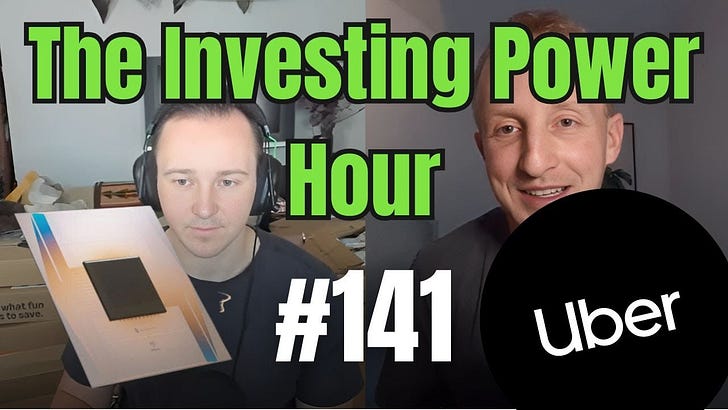[PODCAST] Is Waymo an Existential Threat to Uber?
The rideshare leader is slowly morphing into a battleground stock
YouTube
Spotify
Apple Podcasts
The discourse on Waymo vs. Uber is intensifying. I have been trying to add some fuel to the fire. Maybe we can ladder Uber stock down to a reasonable price? One can hope.
(Disclosure: I do not and have never owned shares of Uber. But it is something I could see myself owning in the future.)
Waymo keeps adding new cities to its network and brags about rapid growth in weekly ridership. It looks like they are doing between 150k and 200k weekly paid rides, growing at a 10x annual rate.
A disruption narrative has formed. Uber’s stock is now in a 30% drawdown:
To add some fuel to the discussion, I tweeted this question:
A lot of people agree. It does look like Uber is facing a rapidly growing new competitor with a technological advantage. Waymo has gained a ton of market share in San Francisco, which has impacted Uber’s market share in the city. However, Uber still has ~50% share, with Lyft losing out more to Waymo.
Clearly, some investors believe in the Waymo disruption narrative, which is why the stock is falling. You can see it in the San Francisco data. However, not everyone is getting on the Waymo train. Here is some pushback that people provided in the discussion tweet:
International expansion. It will be a long time before Waymo is operating outside of the United States, except maybe Canada. Half of Uber’s bookings come from outside North America.
Capital requirements + profitability. Waymo is likely burning a boatload of cash and has huge upfront capital requirements. There are the vehicles, sensors, storage, and computing costs. While I agree there are issues to work out with unit economics, do we think Alphabet cares? No. They could burn $5 billion a year from the division as it scales, it doesn’t matter as long as the long-term ROI is in sight.
Weather limiting market expansion. Waymo only operates in sunny and/or mild-weather cities. They are not expanding to Seattle, Chicago, and Boston. New cities are Austin and Miami, which will eventually run out. I somewhat agree with this sentiment, but would argue this is just an engineering problem that Waymo can likely eventually solve.
We are a long way from Waymo making a dent in Uber’s business:
This debate fascinates me because I don’t really know what to think. At the right price, I would be comfortable owning Uber despite the Waymo risk.
But are we at that price today?
Operating margin has steadily climbed higher:
With gross margins that can hit 35%, I think a 15% operating margin is doable within a few years.
Over the last twelve months, Uber has generated $42 billion in revenue with about 15% revenue growth. Let’s assume revenue growth slows down to 12% over the next three years while operating margin expands to 15%. That is $59 billion in revenue and $8.85 billion in operating earnings.
Uber currently has a market cap of $126 billion. Interesting, to say the least. Interesting enough to buy shares today? I don’t think so. An $80 billion market cap would be quite different, though.
Of course, I exclude enterprise value calculation (Uber has a lot of minority interests) and any segment analysis that could change the valuation work. Uber has a huge eats/delivery business that I didn’t even mention.
This could be a perfect time to do a research or interview episode on Uber. I think we will cover them early in 2025.
-Brett
Chit Chat stocks is presented by:
Public.com has just launched its BOND ACCOUNT. Lock-in interest rates of 6% or higher (as of 9/30/24) by signing up today!
With as little as $1,000, the bond account allows you to buy a diversified portfolio of bonds and lock in your yield even if the Federal Reserve cuts rates.
It only takes a couple of minutes, get started today at Public.com/chitchatstocks and open up a bond fund today!
A Bond Account is a self-directed brokerage account with Public Investing, member FINRA/SIPC. Deposits into this account are used to purchase 10 investment-grade and high-yield bonds. As of 9/26/24, the average, annualized yield to worst (YTW) across the Bond Account is greater than 6%. A bond’s yield is a function of its market price, which can fluctuate; therefore, a bond’s YTW is not “locked in” until the bond is purchased, and your yield at time of purchase may be different from the yield shown here. The “locked in” YTW is not guaranteed; you may receive less than the YTW of the bonds in the Bond Account if you sell any of the bonds before maturity or if the issuer defaults on the bond. Public Investing charges a markup on each bond trade. See our Fee Schedule. Bond Accounts are not recommendations of individual bonds or default allocations. The bonds in the Bond Account have not been selected based on your needs or risk profile. See https://public.com/disclosures/bond-account to learn more.








